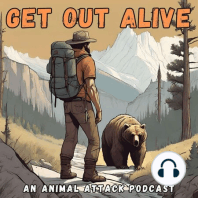39 min listen

Ep. 21: The Boy Who Cried "Tiger"
Ep. 21: The Boy Who Cried "Tiger"
ratings:
Length:
59 minutes
Released:
Mar 2, 2022
Format:
Podcast episode
Description
On Christmas Day in 2007, Carlos Sousa Jr. and his friends Paul and Kulbir Dhaliwhal decided to spend their afternoon at the San Francisco Zoo. One of the last exhibits they wanted to see before the zoo closed that night was the zoo's 4-year old and 243 pound (110kg) Siberian Tiger, Tatiana. The boys just didn't realize exactly how close they were going to get.This case was extremely rare, especially in an AZA-accredited institution. To find a zoo or aquarium near you that holds their animal care to the utmost standards and invests in conservation, visit https://www.aza.org/find-a-zoo-or-aquarium and scroll down to "Currently Accredited Zoos and Aquariums". Follow us on Instagram, Facebook, and check out our website GetOutAlivePodcast.com and join us on Patreon!You can find Ashley @TheAngryOlogist on Twitter and Nick still refuses to engage. Thanks for listening!Disclaimer: This is not professional advice; Follow at your own risk.Support the show
Released:
Mar 2, 2022
Format:
Podcast episode
Titles in the series (79)
Ep. 9: When Beavers Attack by Get Out Alive: An Animal Attack Podcast